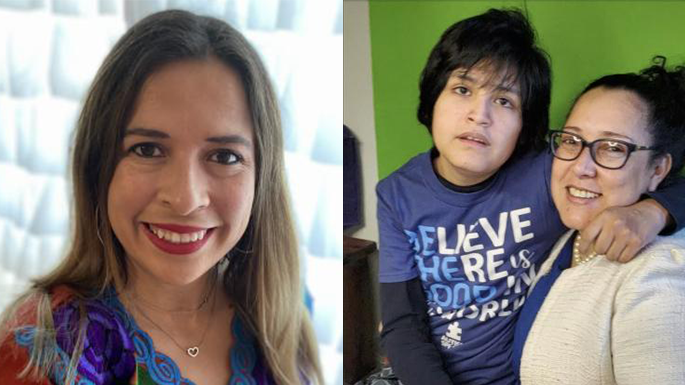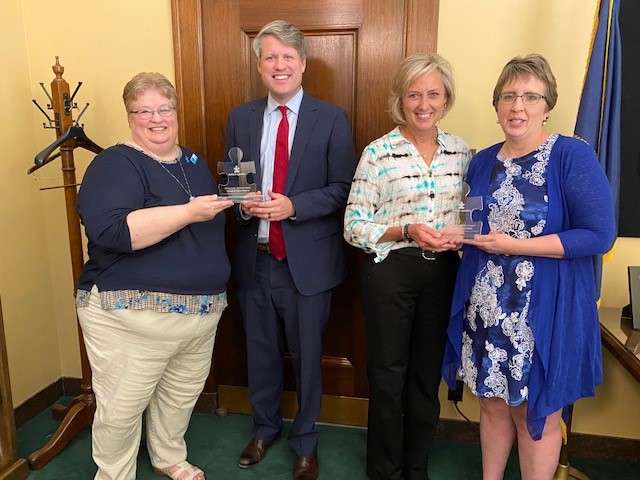|
Over the last few weeks we celebrated Hispanic Heritage Month. Thanks to your generous support, we provided free access to our growing number of Spanish language resources to further support the Hispanic autism community. Monthly highlights also featured two Autism Speaks-supported published research studies of important significance regarding restrictive and repetitive behaviors and sleep challenges; passage of milestone legislation in Nebraska to lower the age of transition planning for students with autism; and the yearlong accomplishments of the newly named Autism Care Network published in their 2021 annual report. You can read more below.
Being a catalyst for life-enhancing research breakthroughs
 Research finds patterns in restrictive and repetitive behaviors based on individual characteristics Research finds patterns in restrictive and repetitive behaviors based on individual characteristics
A study published recently in the Journal of the American Academy of Child and Adolescent Psychiatry and supported by Autism Speaks found differences in restrictive and repetitive behaviors in children with autism based on individual characteristics like age, sex, cognitive functioning, language level and socio-communicative impairments. These findings can help researchers better assess these behaviors and develop more targeted and effective interventions that improve quality of life for people with autism.
New study improves criteria to identify sleep problems in autistic children and adolescents
A study published this September in Sleep Medicine and supported by Autism Speaks has developed and validated a new cut-off value for the Children’s Sleep Habits Questionnaire for autism (CSHQ-autism), a common tool used to screen for sleep difficulties in autistic children and adolescents up to 17 years of age. This discovery will cement the CSHQ-autism as a valid tool to evaluate sleep difficulties in autistic children.
Increasing global understanding and acceptance of people with autism
 Autism Speaks shares stories that make an impact Autism Speaks shares stories that make an impact
In honor of Hispanic Heritage Month, Autism Speaks shared the stories of two Hispanic women and their passionate support of the autistic community. Elfy A. is a volunteer advocacy ambassador who finds inspiration from her autistic son to help protect the rights, services and supports of people with autism in their community. Anabel V. is a member of our Autism Response Team (ART) and is dedicated to providing Spanish-speaking constituents with the real-time support, reliable information, resources and services they need.
Increasing early childhood screening and timely interventions
 Guide to Individualized Education Programs (IEPs) launches in Spanish Guide to Individualized Education Programs (IEPs) launches in Spanish
Autism Speaks’ interactive, mobile-friendly resource for families in the autism community is now available in Spanish! The IEP guide, which has become one of our most popular resources, has been fully digitized and translated to Spanish and provides critical advocacy tools to help families navigate the school system and develop an IEP tailored to their child’s unique strengths and challenges.
“The Big Day” helps raise awareness and identify the signs of autism for Spanish-speaking families
Autism Speaks, in collaboration with the Ad Council, supports parents and caregivers in accessing early screening to help young children reach their full potential. The campaign prompts parents and families to visit screenforautism.org or detecciondeautismo.org to access both English and Spanish language resources to identity the signs of autism, take part in a screening questionnaire and request information from the Autism Speaks Autism Response Team before, during and after a child’s diagnosis.
Improving the transition to adulthood
 Nebraska celebrates lowering the age to begin transition planning for students with autism and other disabilities Nebraska celebrates lowering the age to begin transition planning for students with autism and other disabilities
Autism Speaks recognized Speaker Mike Hilgers, Senator Lynne Walz and Nebraska Department of Education Commissioner Matt Blomstedt for their leadership in passing milestone legislation to lower the required age by which high school students with a developmental disability, including autism, begin planning for their transition to adulthood. Before this law, educators in Nebraska were not required to begin the transition planning process until age 16, which is often too late for students with autism. Now, transition planning can begin at age 14.
Ensuring access to reliable information and services throughout the lifespan
 The ATN/AIR-P Annual Report highlights the Network’s top accomplishments The ATN/AIR-P Annual Report highlights the Network’s top accomplishments
This autumn, the Autism Treatment Network (ATN, now the Autism Care Network) published its 2021 Annual Report outlining the Network’s major accomplishments over the past year. The Network is the first of its kind focused on connecting the dots between families, researchers and healthcare teams to continuously improve autism care. Autism Speaks is proud to support its efforts to improve the health and quality of life of people with autism and their families.


|
![]()
![]()